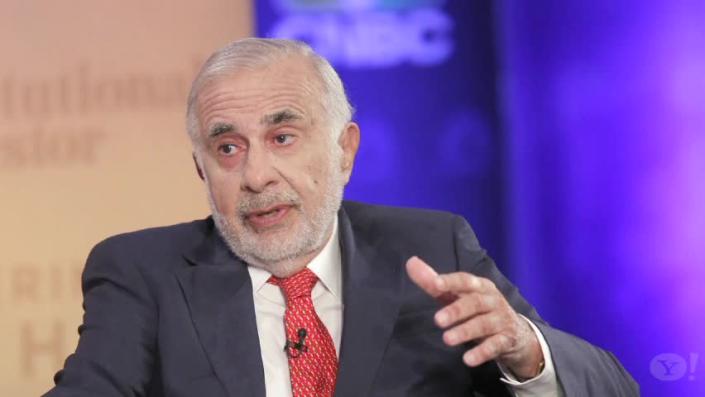Icahn’s Plans for Apple Unlikely to Help Long-Term Shareholders
Apple (AAPL) shares got a short-term boost last week from billionaire investor Carl Icahn’s tweets pressuring the company to borrow money to buy back more stock, but such a move would do little to help long-term investors.

Icahn, who has been involved in takeover battles and shareholder activism since the 1970s, bought about $1 billion worth of Apple shares before going public on Twitter on August 13, according to Reuters. Shares of Apple jumped 11% last week.
"Had a nice conversation with Tim Cook today,” read Icahn's tweet. “Discussed my opinion that a larger buyback should be done now. We plan to speak again shortly.”
He also announced he had accumulated a “large position” in Apple shares, which he believed were “extremely undervalued.”
The problem with Icahn’s plan is that such financial machinations can be a distraction for a technology company that needs to focus on developing innovative new products, according to Arun Sundararajan, professor of information sciences at New York University.
“This kind of financial engineering isn't in the long-term interest of Apple's shareholders,” he says. "They're still a tremendously valuable company, but stock price boosts from financial engineering shouldn't distract from the fact that their business model doesn't look as solid and dominant as it did four years ago."
That’s also the view of University of Southern California professor Gerard Tellis, who has studied the rise and fall of once dominant companies such as Kodak, Blackberry (BBRY) and General Motors (GM).
"Outstanding innovation" vs. " financial engineering"
“The growth of Apple’s stock price was driven by outstanding innovation, not financial engineering,” Tellis, director of the Center for Global Innovation at the USC Marshall School of Business, says. “However, success breeds self-confidence and extreme success breeds lethargy and arrogance.”
There’s also the danger that investors see Apple using borrowed cash to buy back shares instead of investing in new or existing businesses and conclude the company doesn’t have enough good ideas in its pipeline.
Investors seem to have made that harsh judgment of Microsoft, after the software maker announced in January 2003 it would use its cash holdings to start paying a regular dividend. Few technology companies had previously paid regular dividends, preferring to use extra cash to invest in new products. Ten years later, instead of getting a stock price boost, Microsoft shares had lost 4%.
“For a company like Apple, matters of financial policy are very much second-order concerns,” says Justin Pettit, who advises companies about allocating capital as vice president at IHS Consulting. “The exception would be to the extent a financial policy action signaled to the world that they've finally run out of good investment opportunities.”
Even before Icahn’s complaints, Apple was engaged in a major buyback campaign. Fed by a $17 billion bond issue in May, the company spent $16 billion buying back its own shares in the last quarter. Apple announced in April that it would double the amount of its planned share buybacks and dividend payments to $100 billion by the end of 2015.
Its total diluted share count of 924 million at the end of the quarter was 2.4% less than a year earlier.
The cash hoard
But the company is still sitting on a cash hoard of $147 billion, annoying investors such as Icahn who want the company to put that money to work for shareholders. Despite the recent rally, Apple shares remain 27% below the all-time high of $705.07 reached last September.
Much of Apple’s cash is effectively trapped overseas due to the company’s tax-reduction strategies, so Icahn wants Apple to sell bonds and use the proceeds to buy back shares.
Ultimately, the success of a bigger buyback program comes down to whether Apple brings out more great products and reinvigorates sales and profit growth, argues Greg Milano, chief executive of Fortuna Advisors.
“My biggest Apple concern is the new product pipeline, which is getting drawn out, and new products seem to be less new and innovative these days,” Milano says. “If this trend continues, then the future of Apple will be a lot less bright than the past. And this time Steve Jobs cannot come to rescue.”
If Apple gets its act together, the buybacks will magnify the positive impact on Apple’s share price. If the company stumbles further, the share price will drop more rapidly because of the buybacks, Milano says.
Still, not everyone thinks it is a mistake for Apple to heed Icahn’s advice. Ken Yook, a professor at the Johns Hopkins Carey Business School and an expert on stock repurchase plans, says Apple could take advantage of the tax code by following Icahn’s plan and “unlock its hidden value.”
Interest on bonds is tax deductible and interest rates, though they have risen recently, remain at historically low levels.
“Apple should easily be able to sell tens of billion dollars more bonds,” Yook says. “Apple can enjoy the tax shields of debt financing and lower cost of capital, among other benefits, without facing any significant issues.”
With Apple expected to announce a new iPhone on September 10, investors will certainly have other significant issues to consider.
To keep up with all the latest tech industry news, follow Aaron Pressman on Twitter and Tumblr.
Check out more Yahoo! Finance content here on Tumblr.
